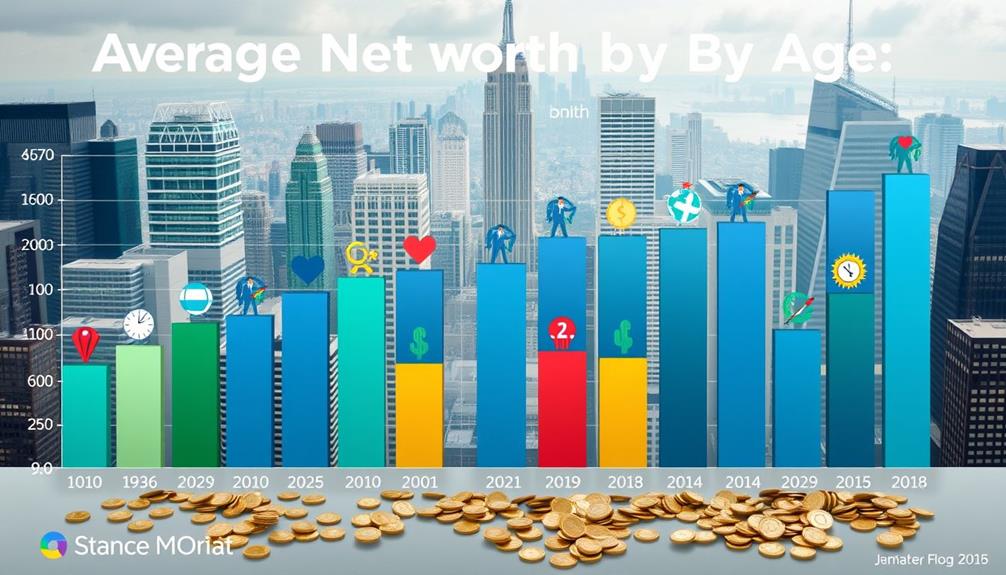Your net worth at each age can be quite revealing, showing how rich you should aim to be. For example, by age 30, your net worth should equal at least your annual salary, while by age 60, you should endeavor for eight times it. These benchmarks help you set realistic financial goals as you advance through life. Remember, a positive net worth means you're accumulating wealth, while a negative one indicates a need for better debt management. Want to see how your results stack up and what they mean for your financial future? There's more to explore.
Key Takeaways
- Net worth benchmarks suggest aiming for 1x your salary by age 30 and increasing to 8x by age 60.
- Average net worth varies significantly by age, reflecting career growth and effective financial planning.
- Age 35 typically sees an average net worth of $549,600, indicating the importance of timely investments.
- Regularly calculating your net worth helps track financial progress and identify areas for improvement.
- Financial literacy is crucial for understanding net worth's impact on long-term wealth accumulation and stability.
Understanding Net Worth
Net worth serves as a vital indicator of your financial health, calculated by subtracting your total liabilities from your total assets. Understanding your net worth helps you gauge your financial stability and identify areas for improvement. A positive net worth signifies that you've accumulated wealth, while a negative net worth might indicate a need for better debt management or financial adjustments.
When you analyze your net worth, it's important to reflect on the factors affecting it. For example, education plays a notable role—bachelor's degree holders have an average net worth of around $300,000, compared to just $26,000 for those without a high school diploma. This disparity highlights how investing in your education can enhance your financial situation.
Additionally, implementing effective budgeting strategies can further contribute to improving your net worth, as a well-structured budget allows for better tracking of income and expenses, ultimately leading to more savings and investment opportunities effective budgeting strategies.
Moreover, it's crucial to recognize that the average net worth can vary markedly across different age groups. Understanding these differences can motivate you to set realistic financial goals.
Average Net Worth by Age

As you progress through life, your average net worth tends to evolve considerably with age. In your early years, specifically under 35, the average net worth hovers around $183,500. This stage marks the beginning of your wealth accumulation journey, and it's vital to avoid gold IRA scams during this time.
Moving into the 35-44 age group, you'll likely see a significant increase to approximately $549,600, reflecting the growth of your career and financial health.
When you reach the 45-54 age bracket, your average net worth typically climbs to about $975,800, often during your peak earning years. This is an important time to focus on building wealth through smart investments and savings.
As you enter the 55-64 age group, your average net worth rises to around $1,566,900, showcasing the rewards of long-term planning.
Calculating Your Net Worth

Calculating your net worth is simple: just subtract your total liabilities from your total assets.
Knowing where you stand financially can help you set benchmarks and understand age-based expectations for wealth accumulation. Regularly evaluating your net worth keeps you on track to achieve your financial goals.
Additionally, considering the impact of various investment strategies, such as gold investment strategies, can further enhance your financial outlook and stability.
Understanding Net Worth Calculation
To determine your financial health, it's essential to calculate your net worth accurately. You can do this using the formula: Net Worth = Total Assets – Total Liabilities.
Start by listing your total assets, which include cash, investments, and property. Make sure to assign fair market value to these assets, but avoid including personal property with uncertain resale value, like collectibles or jewelry.
Additionally, consider diversifying your investment portfolio with options like precious metal investments that can enhance your net worth over time. On the other hand, your liabilities encompass any debts you have, such as loans and credit card balances.
Regularly calculating your net worth helps you track your financial progress and identify trends over time. Online calculators can simplify this process, making it easier for you to assess your personal finance situation.
It's also important to understand the difference between average and median net worth. The median net worth offers a more accurate representation of wealth, as it mitigates the impact of extreme outliers.
Ideal Net Worth Benchmarks
Setting financial goals is essential for your future, and understanding ideal net worth benchmarks can guide you along the way.
These benchmarks provide a clear framework for evaluating your progress toward financial freedom based on your age and income. Additionally, considering diversifying your investments, such as through a Gold IRA, can be a strategic move to safeguard your assets against market fluctuations.
Here's a quick breakdown of what you should aim for:
- Age 30: Net worth should equal at least 1x your annual salary.
- Age 35: Aim for 2x your annual salary.
- Age 40: Target 3x your annual salary.
- Age 50: Endeavor for about 6x your annual salary.
Age-Based Financial Expectations
Understanding your age-based financial expectations can greatly impact your long-term wealth-building strategies. Knowing how your net worth should align with your age can help you set realistic goals. For many Americans, these benchmarks guide financial decisions and investments.
Here's a quick overview of recommended net worth targets based on age for someone earning $50,000 annually:
| Age | Recommended Net Worth |
|---|---|
| 30 | $150,000 |
| 40 | $150,000 |
| 50 | $300,000 |
| 60 | $400,000 |
By age 30, your net worth should ideally be three times your salary, which is $150,000. As you reach age 40, it remains the same. However, by age 50, the goal shifts to six times your salary ($300,000), and by age 60, it's eight times your income, totaling $400,000.
These financial benchmarks aren't just numbers; they represent a pathway to financial security and independence. Keeping these age-based expectations in mind can motivate you to make informed financial choices and ultimately increase your net worth over time.
Income Vs. Net Worth

How do income and net worth differ in shaping your financial future? Understanding these concepts is crucial for your financial well-being.
Income represents the money you earn over time, while net worth is your total assets minus your total liabilities. A positive net worth indicates you've accumulated more assets than debts, which is essential for long-term stability.
Investing in assets such as a Gold IRA can also contribute to building a robust net worth by providing diversification and potential long-term appreciation, acting as a hedge against inflation and economic downturns an investment strategy.
Here's why distinguishing between income and net worth matters:
- Savings Impact: Your income contributes to savings, which directly affects your net worth.
- Spending Habits: A high income can lead to a low net worth if you overspend and accumulate debt.
- Financial Health: Positive net worth reflects a healthier financial state, while negative net worth suggests financial distress.
- Age Trends: For the 35-44 age group, the average net worth is around $549,600, showing how consistent income and smart savings can build wealth over time.
Financial Education Resources

Accessing reliable financial education resources is essential for anyone looking to improve their understanding of net worth and overall financial management. Knowing that the median net worth for families in 2022 was $192,900 can motivate you to evaluate your financial situation.
Educational initiatives reveal a clear connection between higher education and wealth accumulation; for instance, individuals with a bachelor's degree boast a median net worth of $300,000. Additionally, exploring investment strategies in precious metals can provide valuable insights for diversifying your portfolio and enhancing long-term financial security.
To enhance your financial skills, consider engaging with works by advocates like Neale Godfrey, who's authored 27 books focused on improving financial literacy among families and young adults.
Regularly evaluating your net worth is vital for effective financial planning, enabling you to track your progress and adjust your strategies as needed.
Additionally, collaborating with financial experts and diving into credible publications can expose you to essential investment strategies and retirement planning tips.
Wealth Perception and Trends

Wealth Perception and Trends
Financial education not only equips you with the tools to manage your money but also shapes your perception of wealth. Understanding how net worth varies across different demographics can help you navigate your financial landscape more effectively. Here are some trends influencing wealth perception today:
1. Generational Differences: Baby Boomers have an average net worth of $2.8 million, while Millennials average around $2.2 million, highlighting shifts in wealth accumulation.
Additionally, the impact of economic factors such as background checks in employment can influence financial opportunities, particularly for younger generations who are entering the job market and seeking stability in their careers. the importance of background checks
2. Educational Impact: Financial literacy plays a vital role—bachelor's degree holders boast a median net worth of $300,000, compared to just $26,000 for those without a high school diploma.
3. Economic Conditions: Inflation and market fluctuations can greatly impact your net worth, affecting purchasing power and financial stability.
4. Racial Wealth Disparities: The racial wealth gap remains stark, with white families holding a median wealth of $188,200 versus $24,100 for Black families, underscoring the importance of understanding these dynamics.
Racial Wealth Disparities

While systemic issues have long influenced wealth accumulation, racial disparities in net worth remain alarmingly pronounced. The median net worth for White households stands at about $188,200, while Black households average just $24,100, and Hispanic households come in at $36,100. These figures starkly illustrate the wealth gap you mightn't be aware of.
Additionally, the challenges faced by individuals with BPD can complicate financial stability, as emotional dysregulation may affect decision-making and impulse control.
About 20% of Black families report having zero or negative net worth, underscoring the severe financial challenges faced by many. Historical factors like systemic racism and discriminatory practices have led to lower homeownership rates for Black and Hispanic families, which is essential for building wealth.
Moreover, racial disparities in student debt play a considerable role in this divide. Black borrowers carry an average debt that's 30% higher than their White counterparts, greatly hampering their ability to accumulate wealth over time.
Compounding these issues are unequal access to education and employment opportunities; higher education often correlates with increased earning potential and net worth. Understanding these disparities helps frame the broader conversation about wealth and equity in today's society.
The Next Generation's Values

The Next Generation's Values
As you explore the values shaping the next generation, you'll notice a strong emphasis on financial literacy and ethical investing.
Gen Z prioritizes work-life balance, seeking jobs that align with their personal values while ensuring financial stability. This shift reflects a broader definition of success that goes beyond mere wealth accumulation.
Additionally, many young people are turning to freelance opportunities as a way to earn money while pursuing their passions and interests, showcasing their desire for flexibility and autonomy in their careers.
Financial Literacy Importance
Increasingly, young people recognize the critical role of financial literacy in shaping their future. With 81% of Gen Z believing hard work leads to success, understanding financial concepts is essential for making informed financial decisions.
Here's why financial literacy matters:
- Budgeting Skills: Learning to budget effectively helps you track income and expenses, ensuring you live within your means.
- Debt Management: Understanding how to manage debt can prevent financial pitfalls and high-interest traps, allowing you to build wealth over time.
- Retirement Planning: Early financial literacy empowers you to save for retirement, ultimately increasing your net worth by age.
- Wealth Management: Grasping basic wealth management principles enables you to make smarter investments, enhancing your financial security.
As Neale Godfrey emphasizes, teaching young individuals about financial skills equips them to tackle economic challenges head-on.
By prioritizing financial literacy, you'll not only enhance your ability to make sound financial decisions but also set a solid foundation for lasting financial well-being.
In today's economy, that knowledge is your ticket to success.
Ethical Investment Preferences
Ethical investment preferences are reshaping how younger generations approach their finances. You're part of a growing trend that embraces values-based investing, where your investment choices reflect personal beliefs and ethical considerations.
With around 81% of Gen Z believing that hard work leads to success, you want your financial outcomes to align with social and environmental responsibility.
Financial literacy plays a critical role in this shift. You're likely seeking educational resources that help you make informed investment decisions that resonate with your values.
Many young investors, like you, are increasingly turning to sustainable and socially responsible funds, indicating a strong preference for ethical considerations in financial planning.
Research shows that 62% of young investors are willing to pay higher fees for investment products that meet their ethical and sustainability standards. This willingness underscores the importance of aligning your net worth with your values.
Work-Life Balance Priorities
Work-life balance has become a defining value for your generation, with many of you placing a premium on personal fulfillment over traditional measures of success.
You see hard work as a pathway to achieving a quality life, not just financial gain. Emphasizing stability and happiness, you prioritize a holistic approach, redefining what it means to be successful.
Here are four key work-life balance priorities that resonate with your values:
- Financial Security: You believe achieving financial security means being able to handle unexpected expenses without stress.
- Quality Jobs: You value fulfilling careers that provide both personal satisfaction and stability, rather than just high salaries.
- Family and Relationships: You prioritize spending time with loved ones, understanding that strong relationships contribute to overall happiness.
- Financial Literacy: You recognize the importance of being financially literate, empowering you to make informed decisions that align with your values and ethical considerations.
Investment Strategies for Growth

How can you strategically position your investments for maximum growth? First, consider value investing. By focusing on undervalued stocks, you can maximize long-term gains, as this strategy has historically outperformed the market.
Another approach is values-based investing, where you align your choices with personal beliefs. This trend not only reflects your values but also supports sustainable and ethical companies.
A self-directed IRA is another tool for enhancing your financial lives. It provides flexibility, allowing you to diversify beyond traditional stocks and bonds, similar to institutional investors.
Don't forget about tax efficiency; prioritize tax-efficient strategies, like utilizing tax-advantaged accounts, to enhance overall returns and preserve wealth.
Regularly reviewing your portfolio is essential, too. Conduct assessments to adapt to market changes and guarantee your investments align with your financial goals.
This proactive approach can greatly impact your net worth as it's considered throughout your investing journey. By implementing these investment strategies for growth, you're positioning yourself to achieve better long-term outcomes and ultimately strengthen your financial foundation.
Financial Abuse Awareness

Financial abuse can happen in any relationship, often leaving victims feeling trapped and powerless. It's vital to recognize the signs and understand your financial rights to protect yourself. Financial abuse involves the exploitation of someone's finances, typically manifesting in controlling behaviors.
Here are some common indicators:
- Lack of Financial Autonomy: You can't make decisions about your own money.
- Restricted Access to Funds: You're denied access to your bank accounts or credit cards.
- Manipulation of Financial Decisions: Your partner makes all financial choices without your input.
- Isolation from Financial Support Services: You're discouraged from seeking help or advice from others.
Awareness is the first step to combating financial abuse. Educating yourself about your financial rights and available support services can empower you to reclaim your independence.
If you or someone you know is experiencing financial abuse, it's important to seek help. Local organizations and hotlines can provide guidance and resources to navigate these challenging situations.
Conclusion
To sum up, knowing your ideal net worth can empower your financial journey. Surprisingly, the Federal Reserve reports that the average net worth of a 30-year-old is just $76,300, highlighting the disparity in wealth accumulation. By understanding where you stand and the factors influencing your net worth, you can make informed decisions about your finances. Embrace financial education and consider investment strategies that align with your values to build a brighter financial future for yourself and the next generation.









